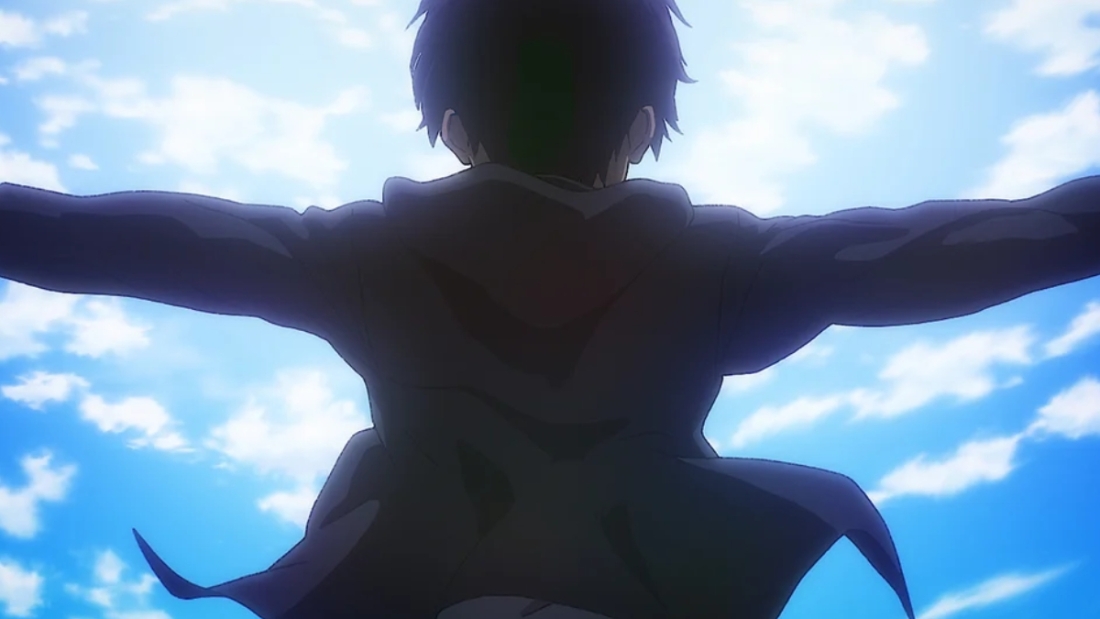Finally, after three long years of being drawn out, the final chapters of Attack on Titan were animated and released Sunday. I read the end of the manga, so I’ve known for some time the ending, but I must say, the anime was better. Regardless, now seems as safest time as any to talk about the ending, and how even after all of Eren’s actions, he knows he can’t stop the cycle of war.
The Ending
The show ends off with the “heroes” of the War of Heaven and Earth, Armin, Jean, Connie, Reiner, Annie, Peick, on a boat headed for Paradis as ambassadors of the new world alliance. They talk and chuckle about how they haven’t been blown up yet by the Jaegerists, who are now the official army of Paradis, and if they will even be heard out.
Mikasa is seen at the tree she buried Eren’s head at, crying about how she misses him; as a bird flies and wraps the scarf he gave her around her neck one last time, symbolizing Eren’s promise that he will always be there to wrap that scarf around her no matter what.
In the post credits, we see Mikasa finally with a family visiting the tree and Eren’s grave: first a husband, then with a child, then with a whole slew of people, and then she is laid to rest with wrinkled hands, presumably next to Eren.
All in all, I loved this ending. But this isnt the part that got people in a tizzy, it’s the end credit time skips. Truthfully, the anime does this much better than the manga.
End Credits
Once Mikasa is shown to have been buried, we get a time skip of Paradis growing. Buildings being created, skyscrapers, advanced civilization, and eventually, helicopters, anti-aircraft weaponry, fighter jets, and then the destruction of Paradis. Complete collapse, overgrown with greenery. Zoom to a boy now in this post-war torn land, he discovers Eren’s tree (which now looks shockingly similar to the tree Founder Ymir discovered the OG Titan powers), there is an entrance, and he proceeds forward.
So, what does it mean?
For me, I think it is obvious that Isayama, the mangaka of Attack on Titan, always meant to show the cycle of war. It’s what the entire fourth season of the show is about. You might ask yourself, “then what was the point?”
Eren wipes out 80% of humanity because it resets the outside world and the Island of Paradis to zero. Which means there will be no one-sided war. This will ensure Eren’s loved ones will be able to live out the rest of their lives as heroes with no threat from anybody, exactly what he wanted. Beyond that, he doesn’t know, nor does he care.
The survivors even call to question: what is to stop the outside world from retaliating against Paradis for their actions?
The answer: nothing.
From what we can infer of the post credit timeskips: all of Eren’s loved ones lived out long lives together, free from harm, which is what he wanted. After that thought, Paradis grew strong, as did the outside world. Eventually, war started again, and Paradis was driven into the ground once more.
Even after all the people who fought in the War of Heaven Earth are all dead and gone, generational hate carries on. Eren didn’t end the war of hatred, he simply reset it. It is a very very poignant message about real life and the decisions we as humans make.
Viewing the young boy approaching Eren’s tree, you can’t help but think that he will come into contact with the very thing that gave Ymir her Titan powers and start this whole thing over again. It is a dark, but very real ending.
This show is so heart wrenching, yet beautiful. Its themes and messages on humanity, society, war, and discrimination are second to none. Isayama is a master at storytelling, foreshadowing, character development, literally everything in a story. It goes from survival-horror, to political-thriller, to anti-war, and does it all so well.
It is a perfect 10/10 show for me. Not only one of the best anime’s ever, but one of the best shows period.



Leave A Comment